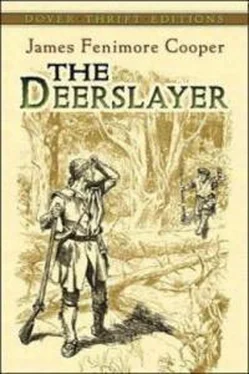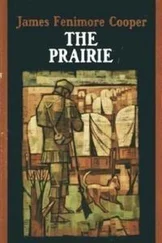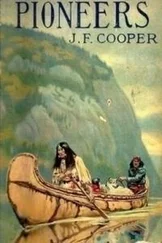Джеймс Купер - The Deerslayer
Здесь есть возможность читать онлайн «Джеймс Купер - The Deerslayer» весь текст электронной книги совершенно бесплатно (целиком полную версию без сокращений). В некоторых случаях можно слушать аудио, скачать через торрент в формате fb2 и присутствует краткое содержание. Год выпуска: 2014, Издательство: epubBooks Classics, Жанр: Исторические приключения, Приключения про индейцев, на английском языке. Описание произведения, (предисловие) а так же отзывы посетителей доступны на портале библиотеки ЛибКат.
- Название:The Deerslayer
- Автор:
- Издательство:epubBooks Classics
- Жанр:
- Год:2014
- ISBN:нет данных
- Рейтинг книги:5 / 5. Голосов: 1
-
Избранное:Добавить в избранное
- Отзывы:
-
Ваша оценка:
- 100
- 1
- 2
- 3
- 4
- 5
The Deerslayer: краткое содержание, описание и аннотация
Предлагаем к чтению аннотацию, описание, краткое содержание или предисловие (зависит от того, что написал сам автор книги «The Deerslayer»). Если вы не нашли необходимую информацию о книге — напишите в комментариях, мы постараемся отыскать её.
The Deerslayer — читать онлайн бесплатно полную книгу (весь текст) целиком
Ниже представлен текст книги, разбитый по страницам. Система сохранения места последней прочитанной страницы, позволяет с удобством читать онлайн бесплатно книгу «The Deerslayer», без необходимости каждый раз заново искать на чём Вы остановились. Поставьте закладку, и сможете в любой момент перейти на страницу, на которой закончили чтение.
Интервал:
Закладка:
But Deerslayer's mind was too much occupied to permit him to be disturbed by the abuse of excited hags, and their rage necessarily increasing with his indifference, as his indifference increased with their rage, the furies soon rendered themselves impotent by their own excesses. Perceiving that the attempt was a complete failure, the warriors interfered to put a stop to this scene, and this so much the more because preparations were now seriously making for the commencement of the real tortures, or that which would put the fortitude of the sufferer to the test of severe bodily pain. A sudden and unlooked for announcement, that proceeded from one of the look–outs, a boy ten or twelve years old, however, put a momentary check to the whole proceedings. As this interruption has a close connection with the dénouement of our story, it shall be given in a separate chapter.
Chapter XXX.
"So deem'st thou—so each mortal deems
Of that which is from that which seems;
But other harvest here
Than that which peasant's scythe demands,
Was gather'd in by sterner hands,
With bayonet, blade, and spear."
It exceeded Deerslayer's power to ascertain what had produced the sudden pause in the movements of his enemies, until the fact was revealed in the due course of events. He perceived that much agitation prevailed among the women in particular, while the warriors rested on their arms in a sort of dignified expectation. It was plain no alarm was excited, though it was not equally apparent that a friendly occurrence produced the delay. Rivenoak was evidently apprised of all, and by a gesture of his arm he appeared to direct the circle to remain unbroken, and for each person to await the issue in the situation he or she then occupied. It required but a minute or two to bring an explanation of this singular and mysterious pause, which was soon terminated by the appearance of Judith on the exterior of the line of bodies, and her ready admission within its circle.
If Deerslayer was startled by this unexpected arrival, well knowing that the quick witted girl could claim none of that exemption from the penalties of captivity that was so cheerfully accorded to her feebler minded sister, he was equally astonished at the guise in which she came. All her ordinary forest attire, neat and becoming as this usually was, had been laid aside for the brocade that has been already mentioned, and which had once before wrought so great and magical an effect in her appearance. Nor was this all. Accustomed to see the ladies of the garrison in the formal, gala attire of the day, and familiar with the more critical niceties of these matters, the girl had managed to complete her dress in a way to leave nothing strikingly defective in its details, or even to betray an incongruity that would have been detected by one practised in the mysteries of the toilet. Head, feet, arms, hands, bust, and drapery, were all in harmony, as female attire was then deemed attractive and harmonious, and the end she aimed at, that of imposing on the uninstructed senses of the savages, by causing them to believe their guest was a woman of rank and importance, might well have succeeded with those whose habits had taught them to discriminate between persons. Judith, in addition to her rare native beauty, had a singular grace of person, and her mother had imparted enough of her own deportment to prevent any striking or offensive vulgarity of manner; so that, sooth to say, the gorgeous dress might have been worse bestowed in nearly every particular. Had it been displayed in a capital, a thousand might have worn it, before one could have been found to do more credit to its gay colours, glossy satins, and rich laces, than the beautiful creature whose person it now aided to adorn. The effect of such an apparition had not been miscalculated. The instant Judith found herself within the circle, she was, in a degree, compensated for the fearful personal risk she ran, by the unequivocal sensation of surprise and admiration produced by her appearance. The grim old warriors uttered their favorite exclamation "hugh!" The younger men were still more sensibly overcome, and even the women were not backward in letting open manifestations of pleasure escape them. It was seldom that these untutored children of the forest had ever seen any white female above the commonest sort, and, as to dress, never before had so much splendor shone before their eyes. The gayest uniforms of both French and English seemed dull compared with the lustre of the brocade, and while the rare personal beauty of the wearer added to the effect produced by its hues, the attire did not fail to adorn that beauty in a way which surpassed even the hopes of its wearer. Deerslayer himself was astounded, and this quite as much by the brilliant picture the girl presented, as at the indifference to consequences with which she had braved the danger of the step she had taken. Under such circumstances, all waited for the visitor to explain her object, which to most of the spectators seemed as inexplicable as her appearance.
"Which of these warriors is the principal chief?" demanded Judith of Deerslayer, as soon as she found it was expected that she should open the communications; "my errand is too important to be delivered to any of inferior rank. First explain to the Hurons what I say; then give an answer to the question I have put."
Deerslayer quietly complied, his auditors greedily listening to the interpretation of the first words that fell from so extraordinary a vision. The demand seemed perfectly in character for one who had every appearance of an exalted rank, herself. Rivenoak gave an appropriate reply, by presenting himself before his fair visitor in a way to leave no doubt that he was entitled to all the consideration he claimed.
"I can believe this, Huron," resumed Judith, enacting her assumed part with a steadiness and dignity that did credit to her powers of imitation, for she strove to impart to her manner the condescending courtesy she had once observed in the wife of a general officer, at a similar though a more amicable scene: "I can believe you to be the principal person of this party; I see in your countenance the marks of thought and reflection. To you, then, I must make my communication."
"Let the Flower of the Woods speak," returned the old chief courteously, as soon as her address had been translated so that all might understand it—"If her words are as pleasant as her looks, they will never quit my ears; I shall hear them long after the winter of Canada has killed all the flowers, and frozen all the speeches of summer."
This admiration was grateful to one constituted like Judith, and contributed to aid her self–possession, quite as much as it fed her vanity. Smiling involuntarily, or in spite of her wish to seem reserved, she proceeded in her plot.
"Now, Huron," she continued, "listen to my words. Your eyes tell you that I am no common woman. I will not say I am queen of this country; she is afar off, in a distant land; but under our gracious monarchs, there are many degrees of rank; one of these I fill. What that rank is precisely, it is unnecessary for me to say, since you would not understand it. For that information you must trust your eyes. You see what I am; you must feel that in listening to my words, you listen to one who can be your friend, or your enemy, as you treat her."
This was well uttered, with a due attention to manner and a steadiness of tone that was really surprising, considering all the circumstances of the case. It was well, though simply rendered into the Indian dialect too, and it was received with a respect and gravity that augured favourably for the girl's success. But Indian thought is not easily traced to its sources. Judith waited with anxiety to hear the answer, filled with hope even while she doubted. Rivenoak was a ready speaker, and he answered as promptly as comported with the notions of Indian decorum; that peculiar people seeming to think a short delay respectful, inasmuch as it manifests that the words already heard have been duly weighed.
Читать дальшеИнтервал:
Закладка:
Похожие книги на «The Deerslayer»
Представляем Вашему вниманию похожие книги на «The Deerslayer» списком для выбора. Мы отобрали схожую по названию и смыслу литературу в надежде предоставить читателям больше вариантов отыскать новые, интересные, ещё непрочитанные произведения.
Обсуждение, отзывы о книге «The Deerslayer» и просто собственные мнения читателей. Оставьте ваши комментарии, напишите, что Вы думаете о произведении, его смысле или главных героях. Укажите что конкретно понравилось, а что нет, и почему Вы так считаете.


![Джеймс Купер - Пионеры, или У истоков Саскуиханны [The Pioneers, or The sources of the Susquehannah]](/books/395797/dzhejms-kuper-pionery-ili-u-istokov-saskuihanny-t-thumb.webp)
![Джеймс Купер - Последний из могикан, или Повествование о 1757 годе [The Last Of The Mohicans]](/books/397341/dzhejms-kuper-poslednij-iz-mogikan-ili-povestvovan-thumb.webp)
![Джеймс Купер - Зверобой, или Первая тропа войны [The Deerslayer, or The First Warpath]](/books/398571/dzhejms-kuper-zveroboj-ili-pervaya-tropa-vojny-the-thumb.webp)







